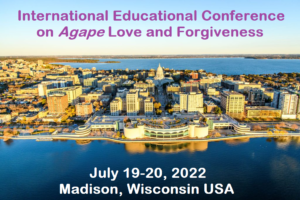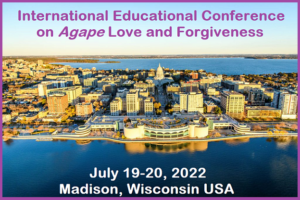Tagged: “Agape Love and Forgiveness Conference”
Agape Love: “A Sense of Joy in the Giving”
The first phase of a multi-million-dollar, multi-year forgiveness research project in three culturally distinct regions of the world is providing clarity to an ancient concept that researchers say could bring psychological health to individuals as well as peace and unity to families, communities, and countries.
“Agape love is an under-researched concept that has significant implications for harmonious relationships and good mental health,” according to forgiveness pioneer Dr. Robert Enright, an educational psychology professor at the University of Wisconsin-Madison and co-founder of the International Forgiveness Institute (IFI). “The goal of this project is to define what agape love is and is not, and to develop accurate measures of agape so we can assess the degree to which a person understands and practices it.”
That 3-year research project is focused on incorporating agape love fundamentals with Dr. Enright’s Forgiveness Education Curriculum materials for grade school students. Working with 60 teachers and up to 1,200 elementary students in Northern Ireland, Israel (both Arabic- and Hebrew-speaking schools), and Taiwan, the research is being funded by the John Templeton Foundation which has been supporting research on forgiveness for more than 20 years.
Agape love is a concept found in at least eight world religions and dates back to the work of three Greek philosophers:
- Socrates (470 BC – 399 BC), who was among the first moral philosophers to espouse the theory of virtue ethics;
- Plato (428 BC – 347 BC), a student of Socrates who is the namesake of Platonic love; and,
- Aristotle (384 BC – 322 BC), a student of Plato, who is called “the father of psychology.”
The influence of those three philosophers continued well into the 19th century, helped shape much of Western moral philosophy, and gained renewed interest with the modern advent of virtue ethics in the late 1950s. This “Aristotelian philosophical view of virtue ethics” was used by Dr. Enright’s initial research team (composed of UW-Madison and IFI researchers) to develop its definition of agape love:
“Agape love is a moral virtue in which a person willingly and unconditionally offers goodness, at a cost to the giver, to another or others in need.”
To further explain, the team added:
“There is a giving of the self to the other(s) that is: a) understood, b) motivated c) willed, and d) acted upon toward other people in such a way that the actions cost the one expressing that love. Because so much is given in agape, it follows that something is taken away from the one who engages in this form of love and such taking away might be needed energy, needed material possessions, needed comfort, and/or even needed safety. Yet, there is a paradox to agape: In the giving, there is psychological gain for the giver, including a sense of joy in the giving.”
That definition was the key element in the research team’s initial report called “The Philosophy and Social Science of Agape Love.” It was published this month in the latest issue of the Journal of Theoretical and Philosophical Psychology, a quarterly publication of the American Psychological Association (APA).
In addition to examining the true meaning of agape love, the research report explores the characteristics of a moral virtue and delineates both the commonalities and significant differences between agape and other forms of love. It also provides an in-depth critique of existing social scientific love scales in preparation for a phase-two activity that will result in the development of a specific psychological agape love scale that is statistically reliable and valid and that has cross-cultural validity.
“Agape love is worth studying because, as a moral virtue, it challenges people to strive for betterment in their humanity,” the report concludes. “Agape requires heroic commitment to the betterment of others. As such, agape may aid humanity in reaching its highest level when people begin to deliberately, consciously, and willingly cultivate this moral virtue.”
The content of the agape and forgiveness  curriculum across the three world zones will be described by the teachers themselves during the International Educational Conference on Agape Love and Forgiveness being held at the University of Wisconsin-Madison campus on July 19-20, 2022. Additional information about agape love and the conference is available at the Agape Love and Forgiveness website.
curriculum across the three world zones will be described by the teachers themselves during the International Educational Conference on Agape Love and Forgiveness being held at the University of Wisconsin-Madison campus on July 19-20, 2022. Additional information about agape love and the conference is available at the Agape Love and Forgiveness website.
A Promise Kept
Have you ever made a promise to love, honor, and obey outside the covenant of marriage? In a certain way, I have.
That promise, which I made in 2002, has now been fulfilled as we turn the clock to 2022. We at the International Forgiveness Institute had just decided to start forgiveness education programs at the century’s turn. The point was this: If learning to forgive can aid people’s recovery from deep injustices against them, then wouldn’t it be a good idea to help young children learn to forgive so that, once the storms of life hit them as adults, then they would have a tool, forgiveness, to avert confusion, resentment, and even possible abiding anger and anxiety? It seemed to be worth a try and so we looked around the globe with this question: Where is there a society that now is post-conflict, which has suffered, and which might benefit from forgiveness education?
Our team at the International Forgiveness Institute, after much thought and discussion, centered on Belfast, Northern Ireland for four reasons: 1) There had been The Troubles across Northern Ireland, in which Irish Catholics and British Protestants were in an escalated conflict since 1972’s Bloody Sunday in Derry/Londonderry; 2) there was a signed peace accord in 1998, which reduced the conflict, but still there was a post-conflict sense of tension; 3) the two groups were English-speaking and so we would not have to start with interpreters; and 4) Ireland and Northern Ireland are two of the closest ports-of-call from the Eastern United States.
So, off my two sons and I went in July of 2002, landing first on the West Coast of the Emerald Isle and then to Belfast, where we met the esteemed Anne Gallagher, who formed Seeds of Hope to do her best to bring peace to Northern Ireland. Anne was amazing in introducing us to primary school personnel and we had the great honor to start forgiveness education in both St. Vincent de Paul Primary School and Ligoniel Primary School, both on the Ligoniel Road in Belfast.
“Forgiveness isn’t something that’s talked about with reconciliation, but it’s needed to bring closure to the pain and suffering experienced in Northern Ireland. You can’t contemplate hope unless you address despair. To heal the wounds of Northern Ireland I believe you have to see humanity in the face of the enemy. Forgiveness is a journey.”
Anne Gallagher (1953-2013)
Upon my first visit to the principal of St. Vincent de Paul School, Mr. Brian McParland, he heard our proposal for forgiveness education and agreed that this is a vital vision for Northern Ireland. He assented to having this programme pioneered in his school. Yet, he quickly added this: “You will not last more than 3 years here in Belfast.” I was surprised to hear that and asked, “Brian, why do you say that?” He looked at me and said, “No one lasts more than 3 years in Belfast. After that time, people grow weary, the thrill of travel wears off and they quit.” I took a deep breath and answered, “Brian, I will give you 20 years.” He looked at me with kindness, but said nothing.
Well, as I consult Siri on the Apple Watch, I see that the calendar is about to turn to the year 2022. Hold on for a minute. . . I have to do a little bit of quick math. Ahh, yes. . . it has been exactly 20 years now since my promise to Mr. McParland. Our International Forgiveness Institute has successfully implemented forgiveness education now in many schools of Belfast and surrounding communities.
As we end the 20th year, some of us at the University of Wisconsin-Madison are doing a research program with 18 classrooms of primary 7 students (grade 5 in the United States), across Northern Ireland, funded by the John Templeton Foundation. This will culminate in an international conference in Madison, Wisconsin, led by Jacqueline Song of our International Forgiveness Institute,  in which these teachers will participate.
in which these teachers will participate.
As I look around, I see that Mr. Brian McParland now is retired from his educational duties. Mrs. Claire Hilman, the principal at Ligoniel Primary in 2002, also is retired. Dear Anne Gallagher now has passed to eternal life. No other educators who joined us two decades ago are still there. As I look around, I see that I have kept my promise now only to God and me. And that is sufficient for the promise-keeping. I hope that at least some in Northern Ireland are the better for it.
A promise kept may bear fruit of which none of us is aware and this is why we press on with the vision for forgiveness education, started two decades ago.
Robert



